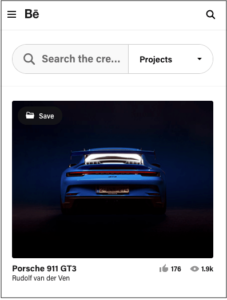Web frameworks support the development of web applications and make it easier to scale them. Frameworks come along with tools and libraries that can help you to develop web applications faster.
Web frameworks help:
- Routing URLs to the relevant handlers
- Making the front-end of the application interact with the back-end data
- Securing the application
- Supporting user authentication
Let us look at seven of the best frameworks for web app development.
Editor's note: GoDaddy now has a hosting centre located in India, enabling faster load times and better security for customer websites. You can read more here.
1. Ruby on Rails
Language: Ruby
First on our list of web app development frameworks is Ruby on Rails. This is an open-source server-side web application framework that uses a proprietary language named Ruby.
Ruby on Rails enables the fast development of apps.

It is a collection of libraries that offers a pre-built solution for repetitive tasks like developing tables, forms, or menus on the website. Ruby on Rails is designed on the widely used web application architecture pattern — Model, View, and Controller (MVC).
Pros:
The syntax of the Ruby language is simple and close to the English language.
It can be easily extended and scaled with new business logic. With the help of libraries, you can quickly and easily deploy the app in production.
Cons: The boot speed and run-time of the framework are slower in comparison to other frameworks. Ruby on Rails offers less flexibility and is more suited if you have something standard in mind.
Websites using Ruby on Rails: Groupon, Urban Dictionary, Airbnb, Shopify, GitHub
2. Angular
Language: JavaScript/TypeScript
Angular is a JavaScript open-source front-end web app development framework designed by Google for creating dynamic web applications.
This front-end framework is good for building single-page applications.

Pros: Being the most popular framework, you can find several helpful forums and YouTube videos on Angular for troubleshooting and learning. Angular also supports TypeScript and Model View Controller (MVC) architecture.
Cons: Older versions of Angular are not compatible with the newer versions that utilize TypeScript. JavaScript has a steep learning curve for new developers.
Websites using Angular: YouTube on PS3, Weather, Netflix, PayPal
Related: Are you designing an OTT Platform?
3. Ember
Language: JavaScript
Next up in our list of web app development frameworks is Ember. It is an almost a decade-old open-source framework based on MVC architecture.
Ember helps web developers build extensible single-page client-facing applications.
Pros: Ember’s package eco-system is well developed, and you can easily identify and select the right package for your requirement. It is well-suited for complex, large-scale applications. It is fully-featured to provide everything one needs to build an app.
Cons: Ember has extensive documentation, but it lacks online resources and support. It has strict conventions and guidelines that sometimes make it cumbersome to adopt a new approach.
Websites using Ember: Netflix, Heroku, Groupon

4. Django
Language: Python
Django is one of the most popular Model View Template (MVT) frameworks and is used primarily for the development of web apps.
Known for its excellent built-in security and batteries-included feature, Django is a highly intuitive and scalable framework.
Pros: Django is a fast, secure, scalable, and versatile framework. Being a full-stack framework, developers can use Django on both the front- as well as back-end.
Cons: In Django, URL-specifying with regular expressions is difficult for beginners. It also feels a little bloated for small projects.
Websites using Django: Pinterest, Instagram, Quora
5. Laravel
Language: PHP
Released in 2011 by Taylor Otwell, Laravel is also an MVC framework based on the popular PHP language.
This framework is relatively new and is excellent for beginners.
Laravel is known for its simplicity and readability.
Pros: Beginners can start learning with the Laracasts tutorial library, full of videos covering topics on PHP and other front-end technologies compatible with Laravel.
Laravel comes with API support out of the box, and it also hosts different packages that could extend its reach.
Cons: Not the best choice for larger projects.
Websites using Laravel: Delta Net travel, Neighborhood Lender
6. ASP.NET
Language: C#
Developed by Microsoft, ASP.NET is designed to ease interactive web application development and build dynamic websites. It’s sleek, minimalistic, and high-performing.
Pros: The framework technology helps to reduce the development time, particularly in complex applications. ASP.NET also delivers enhanced performance and scalability.
Cons: One of the major issues with ASP.NET is the HTML size of controls and view state. View state stores all the data rendered, and the final HTML gets too bulky. ASP.NET is also expensive as compared to other open-source frameworks.
Websites using ASP.NET: Getty Images, Taco Bell, Stack Overflow
7. Vue
Language: JavaScript

Vue is a progressive JavaScript framework used by web developers to build front-end user interfaces. It is a combination of the best methodologies adopted for Angular and React and delivers a modern-looking design.
Pros: Vue is one of the easiest frameworks to start. Due to this, it is a popular platform among the developer community. It is easy to integrate with other libraries that focus on the view layer.
Cons: Learning resources and online support is not robust like Angular. Sometimes the increased flexibility results in errors and irregularities in the code.
Websites using Vue: Behance, Spendesk, Yousign
Types of web application frameworks
Web application frameworks are divided into two main types. The frameworks are classified as server-side or client-side web application frameworks.
Server-side web application framework
These frameworks help in implementing the back-end business logic. Server-side frameworks are capable of managing databases, HTTP requests, URL mapping, and securing the application.
These are best-suited for creating simple web pages, forms, and landing pages.
The most popular server-side web frameworks are:
- Django (Python)
- Express (Node.js/JavaScript)
- Ruby on Rails (Ruby)
- NET (C#)
Client-side web application framework
Client-side frameworks work in the browser and manage the user interface of the application.
Client-side frameworks take user experience to the next level by supporting animated features. Most client-side frameworks are based on the Javascript client layer.
Examples of Client-Side Frameworks include:
- Angular
- Ember
- React
To help you pick the best framework for your web application, we have compiled the list mentioned above to help you make the right decision.
Web app development
In this article, I've discussed the seven most popular frameworks for web app development.
All of them have their pros and cons in a particular scenario.
Choice of web framework is a critical factor in the application development process. I hope this article can help you to select the correct framework for your next application.
________________________________
More time = happier clients
When you use the Hub by GoDaddy Pro, suddenly there’s more time in your day to focus on what matters most. Forget about juggling admin tasks. Reclaim your time and use it to make clients feel like the center of your universe.







